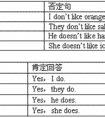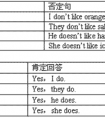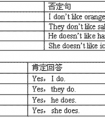改错,选出错误的那一项,并在横线上改正。( ) 1. He'sgoingtoseeheparentstoday._________________ A B C D ( ) 2.Wouldyoulikegowithus? _________________ AB C D( -六年级英语
(6)from从……,来自……,因为……
Where are you from? 你是哪里人?
He diedf rom an accident. 他死于一场事故。
(7)of……的,属于……
This is a map of China.这是一张中国地图。
(8)with使用、和……在一起
We write with a pen. 我们用笔写字。
Can you go to the park with me? 你能和我一起去公园吗?
注意:在last, next, this, that, some, every 等词之前一律不用介词。如:We meet every day.
小学常见介词:
1.on
(1) 在------上面 The book is on the desk.
(2) 在------(哪一天/星期)What do you do on Wednesday?
(3) 在------(月、日)My birthday is on August 2nd.
2. in
(1)在------里面 The pens are in the pencil-box.
(2)在------(哪一年/月)His birthday is in October.
He worked here in 1992.
(3 ) 在------(地方) He works in Dongguan.
(4 ) 在------之内 What are you going to do in 20 years?
(5 ) 在------(早上、下午、晚上)
I do morning exercises in the morning every day.
I usually play basketball in the afternoon.
I often do my homework in the evening.
3. under
在------底下 There is a ball under the bed.
4. near
在------附近 There is a book shop near our school.
5. in front of
在------前面 A boy is standing in front of the house.
6. beside
在------旁边 A football is beside the door.
7. next to
紧挨着 There is a bus station next to No. 13 Middle School.
8. over
在------正上方 A bridge is over the river.
9. on the left
在------左边 The bookstore is on the left.
10. on the right
在------右边 The hospital is on the right.
11. before
在……之前 Mike sits before me.
12. after
在------以后 He went home after school.
13. in the middle
在------中间 The road is in the middle.
14. at
(1) 在------(小地方) I am at school today. I was at home yesterday.
(2) 在------(点钟) I usually go to school at 8:00 am.
(3)看一看 Look at the blackboard.
(4) 在中午 at noon
15. behind
在------后面 There is a broom behind the door.
16.for
(1)给 This present is for you.
(2)为了 Thank you for telling me the way to the zoo.
(3)作为 We have some chips and hamburgers for lunch.
17.to
(1) 到 Take your sport shoes to the P.E class.
(2) 致 Happy birthday to you. Give it to your friend.
18. from
来自 I am from China. = I come from China.
19. from --- to
从------到------ Line up from shorter to taller.
We have class from Monday to Friday.
20. of
------的 He is a student of Kama School.
21. by
(1)在------之前 We must be at home by 6 o’clock.
(2)乘------交通工具 People can go to the moon by spaceship.
I go to school by bus.
22.with
(1) 用 I write a letter with a pen.
(2) 和------一起 He went to Shenzhen with his parents.
23. between
在------与------之间 There is a football match between Class One and Class Three.
24. into
到------里 Sharks can dive into the deep cold water.
25. like
(1)象------ The twins are like their father.
(2)长相------怎样? What’s he like?
26. up
向上 Put up your hands if you have any questions.
27. down
向下 Put down all the books here.
28. about
(1) 大约;关于 It’s about 6:00 now.
(2) ------怎么样? What about---? How about---?
29. what for
为什么 But what for?
早、午、晚要用in,at黎明、午夜、点与分。
年、月、年月、季节、周,阳光、灯、影、衣、冒in。
将来时态in...以后,小处at大处in。
有形with无形by,语言、单位、材料in。
特征、方面与方式,心情成语惯用in。
介词at和to表方向,攻击、位置、恶、善分。
日子、日期、年月日,星期加上早、午、晚,
收音、农场、值日on,关于、基础、靠、著论。
着、罢、出售、偷、公、假,故意、支付、相反,准。
特定时日和"一……就",on后常接动名词。
年、月、日加早、午、晚,of之前on代in。
步行、驴、马、玩笑on,cab,carriage则用in。
at山脚、门口、在当前,速、温、日落、价、核心。
工具、和、同随with,具有、独立、就、原因。
就……来说宾译主,对、有、方状、表细分。
海、陆、空、车、偶、被by,单数、人类know to man。
this、that、tomorrow,yesterday,next、last、one。
接年、月、季、星期、周,介词省略已习惯。
over、under正上下,above、below则不然,
若与数量词连用,混合使用亦无关。
beyond超出、无、不能,against靠着,对与反。
besides,except分内外,among之内along沿。
同类比较except,加for异类记心间。
原状because of,、 owing to、 due to表语形容词
under后接修、建中,of、from物、化分。
before、after表一点, ago、later表一段。
before能接完成时,ago过去极有限。
since以来during间,since时态多变换。
与之相比beside,除了last but one。
复不定for、找、价、原,对、给、段、去、为、作、赞。
快到、对、向towards,工、学、军、城、北、上、南。
but for否定用虚拟,复合介词待后言。
ing型由于鉴,除了除外与包合。
之后、关于、在......方面,有关介词须记全。
in内to外表位置,山、水、国界to在前。
考点名称:一般过去时,动词过去式
一般过去时:
表示过去某个时间里发生的动作或状态;过去习惯性、经常性的动作、行为;过去主语所具备的能力和性格。
be动词在第一人称是单数和第三人称是单数是用was,其余用were。
a. 表示在过去时间里所发生的动作或存在的状态,常与表示过去的时间状语。
yesterday(昨天)、last week (上星期)、an hour ago(一小时前)等连用。
例:I went to the zoo with my father last Sunday. 上周日我和我爸爸去动物园了。
They weren't able to come because they were so busy.他太忙了,所以去不了。
b. 表示在过去一段时间里,经常性或习惯性的动作或状态。
例:My brother watched the World Cup every day last month.上个月哥哥每天都看世界杯比赛。- 一般过去时句法结构:
肯定形式
主语+动词过去式+其他
例句:She often came to help us in those days.
否定形式
①was/were+not;②在行为动词前加didn't,同时还原行为动词
例句:I didn't know you like coffee
一般疑问句
①Did+主语+do+其他? ②Was\Were+主语+表语?
例句:Did I do that?
用表格整理如下:肯定式 疑问式 否定式 疑问否定式 Iworked Did I work? I did not work Did I not work? He(She,It) worked Did he(she,it) work? He(she,it) did not work Did he(she,it) notwork? We worked Did we work? We did not work Did we not work? You worked Did you work? You did not work Did you not work? They worked Did they work? They did not work Did they not work?
结构句型:
1.一般句子
I watched TV last night.
2.一般疑问句
Did you watch TV last night?
3.there be 句型
There was an apple on the table last night.
Was there an apple on the table last night
- 最新内容
- 相关内容
- 网友推荐
- 图文推荐
| [家长教育] 孩子为什么会和父母感情疏离? (2019-07-14) |
| [教师分享] 给远方姐姐的一封信 (2018-11-07) |
| [教师分享] 伸缩门 (2018-11-07) |
| [教师分享] 回家乡 (2018-11-07) |
| [教师分享] 是风味也是人间 (2018-11-07) |
| [教师分享] 一句格言的启示 (2018-11-07) |
| [教师分享] 无规矩不成方圆 (2018-11-07) |
| [教师分享] 第十届全国教育名家论坛有感(二) (2018-11-07) |
| [教师分享] 贪玩的小狗 (2018-11-07) |
| [教师分享] 未命名文章 (2018-11-07) |

![John _____________ an air-conditioner in _____________ bedroom.[ ]A. have, himB. has, hisC. has, he-五年级英语](http://www.00-edu.com/d/file/ks/4/1/23/2019-08-16/small54858f2c11067f43b6431ea11c99345f1565909294.png)


![What's his name? ____________ name is Li Ming. [ ]A. HisB. Her-三年级英语](http://www.00-edu.com/d/file/ks/4/1/23/2019-08-16/smallbf3f2eef41637228ad7cb0082b827bb31565909431.jpg)



